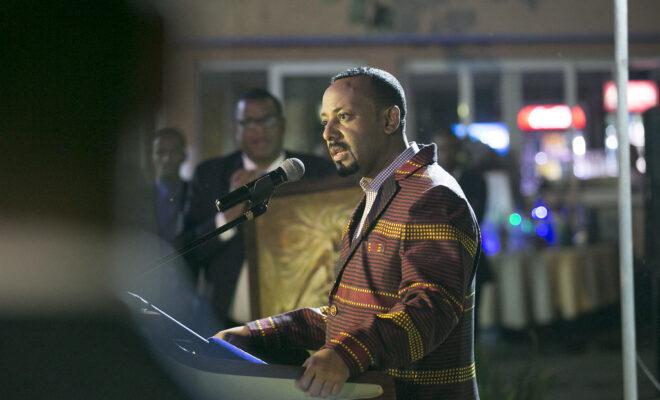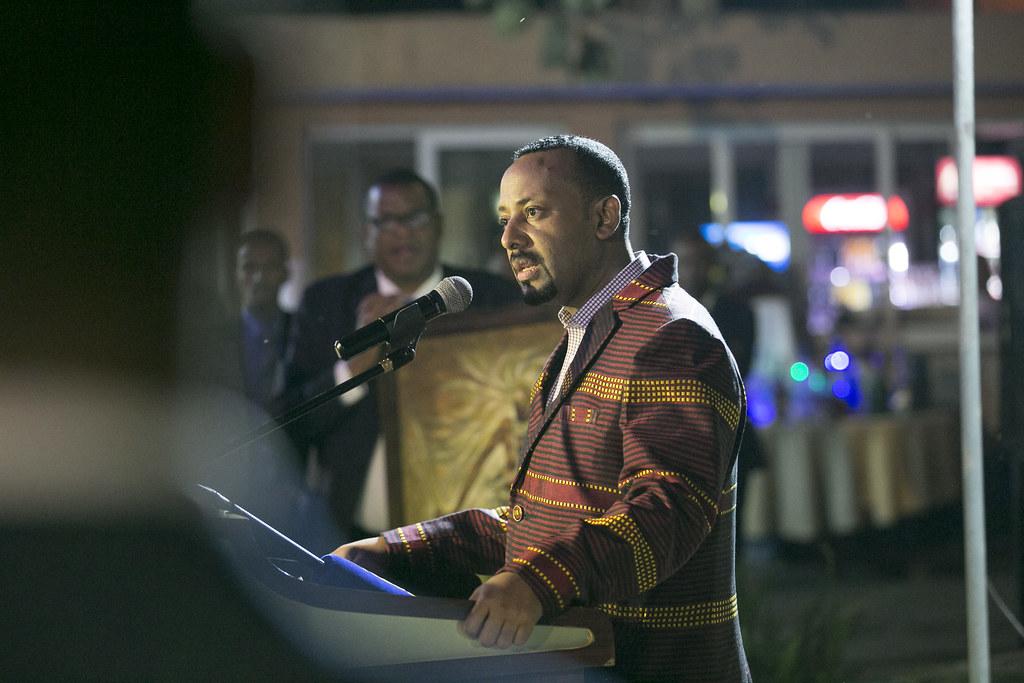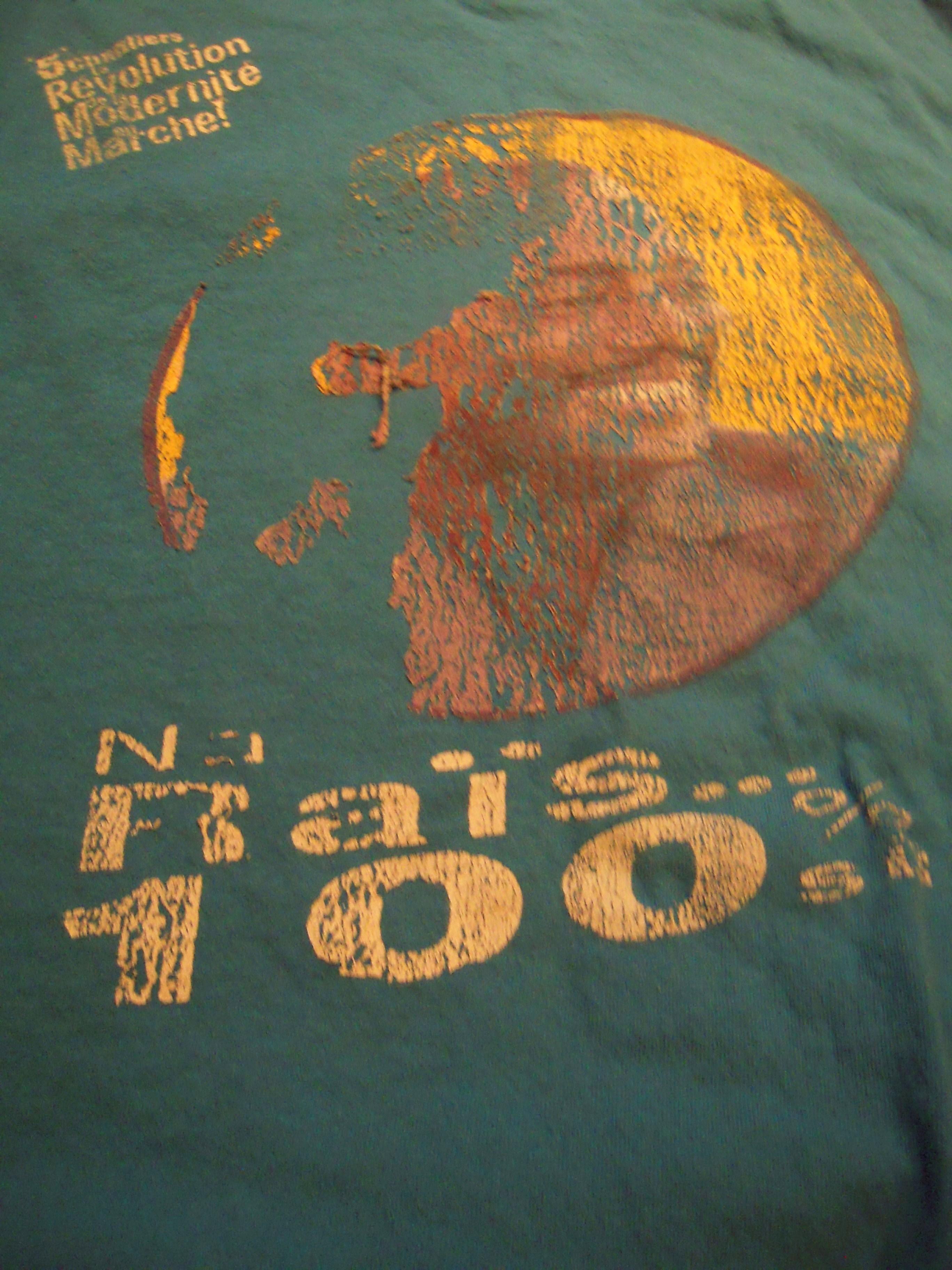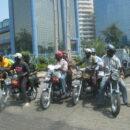Tigray: How Ethiopia reached this crisis point and how it could get out

Virtually all Ethiopia’s neighbours and partners are against the conflict in Tigray, but can they stop it?

Ethiopia’s Prime Minister Abiy Ahmed. Credit: Paul Kagame.
The current crisis in Tigray has not appeared from the clear blue sky. Its roots are deep in Ethiopia’s history and its outcome will dictate the country’s future.
It is unlikely Ethiopia will fall apart. But a period of violence is probable and will continue until there is a further adjustment of government at the centre and a rebalancing of the relationship with the regions. Increased democratisation is one potential solution, but by no means the only outcome.
Ethiopia’s historical balancing act
Throughout its history, Ethiopia has been in a state of flux. Its central authority has waxed and waned and its borders have grown and shrunk as regions on the periphery have had more or less independence. During the 20th century, Ethiopia struggled with the impact of globalisation. It was able to resist Italy’s imperial ambitions and Emperor Haile Selassie benefited from the national unity this challenge created. But his regime, though attuned to the need to maintain a delicate regional and ethnic balance, proved too sclerotic to respond to the new challenges of a rapidly changing world. It fell to the brutal centralisation and Marxist modernisation of the Derg, which sought to maintain its authority through force and terror.
This also failed, and it was in the struggle to overthrow the Derg, which fell in 1991, that the Tigray region became a key player in the country. That armed struggle was led jointly by the Eritrean People’s Liberation Front (EPLF) and Tigrayan People’s Liberation Front (TPLF), the two most effective fighting forces in the country. Eritrea’s reward for victory was independence. The TPLF’s reward was a controlling interest in the post-war government.
Both parties, along with representatives of other regions, were part of the Ethiopian People’s Revolutionary Democratic Front (EPRDF), the wartime coalition against the Derg. The TPLF’s leader Meles Zenawi led the coalition and emerged as the new Prime Minister, giving Tigrayans a tight grip on the new government’s security apparatus. The new constitution was based on ethnic federalism, with each ethnic region given a right to secede, but political control was firmly maintained by the constituent parties of the EPRDF who brooked no rival in their respective regions.
Stability depended on two things. The first was the EPRDF’s successful efforts to modernise the Ethiopian economy, preventing future famines such as the one that led to the downfall of the Derg, and creating new jobs through inward investment and rapid industrialisation. The second was Meles’ ability to maintain a political balance between the different ethnic parties that made up the EPRDF. While external or public criticism of the government was suppressed, vigorous debate took place within it, behind closed doors.
Tentative steps towards greater democracy in the 2005 elections frightened the EPRDF leadership, which realised it might unleash forces they would be unable control. The subsequent clampdown was primarily aimed at preserving the existing regime. Opposition politicians, human rights activists and independent journalists were locked up. And at the subsequent elections in 2010 and 2015, the EPRDF parties managed elections in order to secure victory, garnering 95% of the vote in 2015. Before his death in 2012, Meles defended this direction in private on the grounds that it was too soon to liberalise; more open political debate would risk destabilising the country which could all too easily fall apart.
But the failure to democratise stored up resentment against the EPRDF. When Meles died in 2012, the appointment as Prime Minister of a non-Tigrayan, Hailemariam Desalegn from the south of the country, failed to restore the party’s credibility. Popular unrest in a number of regions, especially amongst the largest ethnic group in Oromia, broke out in huge and growing protests in 2018. The EPRDF swiftly replaced Hailemariam with Abiy Ahmed, the first Oromo and first person of mixed Muslim and Christian parentage to become Prime Minister.
Enter Abiy
Though a man from the inside of Ethiopia’s security apparatus, Abiy moved fast to release political prisoners and side-line or remove the existing Tigrayan leaders at the federal level. Targeting the existing elite, including those accused of corruption, was popular and opened opportunities to promote those from other regions. Abiy also replaced the EPRDF, which guaranteed a regional balance, with the Prosperity Party which, while perhaps seeking to break down regional differences, was also more centralised on himself as the leader. Throughout government, Tigrayans found themselves removed from positions of influence. Abiy defended his actions in his public statement of 9 November 2020.
The extent of this purge undermined confidence amongst Tigrayans that their interests would continue to be protected. Their political leadership withdrew to Tigray, in the north of the country, and debated how to respond. When Abiy postponed indefinitely the country-wide elections due in August 2020 amid the COVID-19 pandemic, they asserted their autonomy by going ahead with elections in Tigray alone. They also mobilised military units which still constituted a core (and some would say the most effective) part of Ethiopia’s army.
For Abiy, if Tigray is seen to be able to defy the federal government, so too will other regions. He makes a point of highlighting Tigrayan contacts with other separatist groups. For him, it is therefore imperative to reassert central authority over Tigray, and he has chosen to do so by force rather than co-option or negotiation. When Tigrayans took control of federal military equipment in the region and refused to allow a non-Tigrayan sent by Abiy to take over the Northern Command, this became for him a casus belli.
The Tigray standoff
Tigray is a tough and mountainous region. Though landlocked and containing only 6 million of Ethiopia’s 100 million population, Tigrayans troops will fight ferociously to defend their land. Abiy has the advantage of air power and an ally to the north in Eritrea, but a war in this country is more likely to end up like that in Yemen than that against Biafra.
Tigray is not – at least not yet – fighting for secession. Its leaders do not want Ethiopia to disintegrate, but for Tigray to have a respected place at the centre and sufficient autonomy in their region. Their objective seems to be regime change rather than independence. But they no longer trust Abiy. This is therefore becoming a direct power struggle, not so much for control of the state as over what kind of state Ethiopia should be and the balance between its constituent parts.
So there is a stand-off. Abiy will not negotiate with the Tigrayans and the Tigrayans will not negotiate with Abiy. The scope for international mediation is therefore limited. But the prospect for a decisive military outcome is equally dim. An intensified civil war resulting in a violent stalemate beckons.
Two influential factors
At which point two factors will influence the outcome: events elsewhere in Ethiopia; and the role and influence of Ethiopia’s neighbours.
One reason for Abiy’s action is an awareness of his own vulnerability if unrest spreads to other regions. Amongst the wider population, the hopes for change pinned on Abiy when he became PM have been largely disappointed, especially in Oromia. Having dismantled the EPRDF, it is less clear how regional interests can make their concerns known in Addis Ababa or how an internal debate can take place within the ruling party. In concentrating power in his own hands, Abiy has actually weakened the centre. Who are now his allies? Primarily, it seems, the Amhara who benefited most from the TPLF’s withdrawal. This makes the situation in Oromia most critical and unpredictable.
All Ethiopia’s neighbours in the Horn are deeply concerned about the regional instability a war in Ethiopia would cause – except one. Underpinning Abiy’s reconciliation with Eritrea – or more precisely with President Isaias Aferwerki – was a mutual distrust of Tigray. The bloody and apparently pointless border war between Eritrea and Ethiopia in 1998-2000 was prolonged by the intense personal rivalry between Isaias and Meles. Eritrea’s support, tacit or active, for Abiy’s efforts to crush Tigray means the region will be cut off from outside supply if its contacts with Sudan or Djibouti are severed. Hence the Ethiopian Army’s efforts to secure the Sudan border, across which thousands of refugees are fleeing, as well as Tigray’s airports. Djibouti is already deeply worried about the collateral damage it could suffer.
The regional organisation, IGAD, is toothless and has usually relied on Ethiopian leadership. But if supported by the African Union (AU), Abiy would find it hard to ignore his neighbours if they speak with a single voice. Aside from Eritrea, other regional leaders have no wish to take sides and every interest in encouraging a solution by negotiation. The Tigrayan leader, Debretsion Gebremichael, has already appealed for AU mediation, but Abiy is reluctant to let any outsiders in on the quarrel.
Both Saudi Arabia and the UAE could help encourage him. They have supported Abiy up to now, including financially, and Saudi Arabia is aware it could find refugees flooding across the Red Sea if fighting spreads.
The wider international community too has nothing to gain from a civil war. China has big investments, Russia has no bases, and “the West” is desperate for Ethiopia to be a successful example of economic and political progress to help stabilise an unstable region where conflicts simmer in South Sudan and Somalia and where Sudan is going through a delicate transition. But internationally, the UN Security Council still seems hamstrung and action looks unlikely.
The only way out?
At this stage, most likely outcomes look bad. It is in crises like this that a physical meeting, brokered by a neutral party, is often the only way to move forward. It is hard to bang heads together by Zoom. But with leaders reluctant to meet in person, the chances of forestalling these outcomes is slipping away.
It needs South Africa’s President Cyril Ramaphosa, as AU Chair, together with Ethiopia’s neighbours and with support from the US, EU, UK, China and the Gulf countries, to persuade Abiy and the Tigrayans that there is no military solution and to get a negotiation process under way.
Where would these negotiations go? Somewhere that solves the underlying problems: by ensuring all regions feel they have a recognised stake at the centre through the federal system, and that all people feel they have an avenue for their grievances can be addressed through a commitment to real democratisation.
Without at least the start of a discussion on these lines, the Horn will be faced with a new and intractable conflict that risks destabilising them all.
Corrections [16 November 2020]: The date of the “subsequent elections” was changed to include a mention of the 2010 as well as 2015. The year in which the Derg “fell” was changed to 1991; although the Derg was formally abolished in 1987, its leaders remained in power until 1991.







I am in agreement with Mr. Westcott that the current crisis should not be allowed to degenerate into a civil war and that we should make a stop to it as soon as possible.
While agreeing with the general thrust of his article about the need to stop the conflict, I would like to point out a few items that I disagree with and whose accuracy I question.
What occurred after the 2005 elections was not a simple ‘clampdown’. Over 290 people were murdered by specially trained snipers and over 10,000 people were rounded up and sent to concentration camps where hundreds more died. The EU Representative at the time Tim Clarke acknowledged this fact and his plea for humane treatment of prisoners was met with derision. Further we remember the Election Report put out by the EU on the 2005 elections criticizing the conduct of the elections aftermath was said to be “trash that deserves to be thrown in the garbage” by strongman Meles Zenawi.
The statement that says ‘. Throughout government, Tigrayans found themselves removed from positions of influence’ is quite misleading.
The TPLF fought hard to prevent Abiy from being at the helm of EPRDF preferring Shiferaw Shigute. When their efforts failed, and it became clear that Abiy will be the Chairman and also the Prime Minister, Getachew Assefa, Head of National Security; Major General Kinfe, Head of METEC , Major Teklebirhan, Head of INSA and others immediately resigned their positions and retreated to Tigray, without so much as conducting a smooth transfer to whoever was going to be assigned to their positions, once they resigned.
With regards to the current crisis, Mr. Westcott asserts ‘Abiy ‘has chosen to do so by force rather than co-option or negotiation’, this is quite disingenuous.
For the past two and half years continuous efforts have been made by the central government, the EPRDF and later the Prosperity Party as well as traditional elders group and the National Reconciliation Commission to bring the TPLF to the negotiation table which was arrogantly rebuffed.
How Mr. Westcott makes light of his statement ‘Tigrayans took control of federal military equipment’ is mind boggling. The reality was that Special Forces of TPLF and rogue elements within ENDF coordinated an attack on ENDF’s Northern Command, massacred soldiers, murdered commanding Generals, took control of military equipments and declared their intention of using them in an offensive and as he says with the intention of ‘regime change’.
If such a treacherous betrayal of the ENDF by a regional force does not provoke a response by the central government, I do not know what would.
By the way the Derg fell in 1991 and not 1987.
Z.Tesfaye
Typo: I believe you meant to say 2007 in this paragraph (not 2015). Well balanced, and insightful, and a political path from an assured ruin, and no gloom and doom.
±±++++++++++
And at the subsequent 2015 elections, the EPRDF parties secured 95% of the vote. Meles defended this move in private on the grounds that it was too soon to liberalise; more open political debate would risk destabilising the country which could all too easily fall apart.
Full of TRASH!! Typical white mans mentality savior I Know it all.
This kind of article is neither helpful or credible. It’s loaded with so much inaccuracies and a prescriptive agenda. This old colonial “we know what’s best for you” attitude has really lost sight of the evolving complications of the colonial legacy. This argument being promoted here is invalid and hurtful.
What a waste of my time! This is no African Argument… this is a typical white mentality colonial redundancy. Get off your high horse, the Horn region has started to solve its own problems and cleaning itself from its cancerous TPLF plague.
Why the writer sidelined and biased
Really, TPLF has been requested to negotiate for the past two and half years through elders elected from different ethnic groups, elders from religious and influential persons. In all of the discussion, they have always had that gruella war mentality. They provide ultimate, they essentially talk with the government only when all of their interest keeps fulfilling. Their hegemonies mentality which they used to rule the country over the past 27 years, limited them to not sit to talk equally with other groups or any political parties for that matter. Over the past two and half years, TPLF has instigated ethnic conflict, masterminding and confiscated genocides against ethnic minorities at various places in the country. TPLF, claims of sidelining to Tigrian’s people is baseless and shameful. These are a group of mafia’s who trade in the name of their ethnicity, disintegration of the country without the presence of their hegemonic regime, nonetheless these bandits are the only fascist the world ever seen after Nazi, who obliterated wombs of a pregnant women’s, men’s, and children’s in their home. The writer mistaken the history of the Ethiopian people who stand against the intruders and perpetrator who questioned Ethiopian existence as a country. I hope the writer can only have listened to their propaganda machine or who he/she believe TPLF are very guerilla fighters, not in the eyes of Ethiopian who are dedicated to the unity of the country, they are baseless propagandists who deceived their community and the world at large.
They are in some political menopause’s.
TPLF will be cut out of Ethiopian politics because they were long held cancers.
This paper prepared by Junta -woyanne and presented by paid personnel. it could not know the existing reality of the country. Ethiopia is not reflected by you the paid guy. White man as you mentioned could not solve the existing issues. It is not war. it is applying rule of law.
They should let it play out for a few weeks.
We don’t have to put aside Ehiopia’s past internal colonization through Ethiopianization(amharization) idelongy by supressing, marginalizing ethnics and substituting other ethic’s languge, culture and indentity by amhara’s one.so its better to openly discuss everything rather than leaving it out.
I am simply appalled by the attacks ‘white ‘white’ ,why not focus on the issue at hand.Mind you a white man is trying (despite some inaccuracies) to address a mess ‘black men’ began and are in.
“We are now fully armed. We are not inferior to them in weapons; Maybe we are better!” says their Tplf leader DebreTsion. For those not familiar with conditions in Ethiopia here is a background. 1/ Ethnic politics is the brainchild of Tplf. 2/ Tplf arbitrarily created ethnic borders extending its own to Sudan in the West and south to Northern Wollo AND resettling Tigrayans. 3/ This started a simmering grievance. 4/ Every dissent was met with kidnappings, murder, and charges of “terrorism” (right under the nose of the West). 5/ Tplf soon instituted what was termed “1 to 5”, a system of spying on each other, rewarding those recruited for the purpose. 6/ Every ethnic group was to reside within borders assigned it; only Tplf members could settle and do business throughout the country. This was the beginning of a deepening resentment leading to mass protests, arrests, and brutal killings in Oromia!
In the present case, the Federal Govt replaced the regional commanding general for reasons of questionable loyalty. Tplf (a local ethnic ‘party’) blocked the transition and pre-empted carnage within the army and on non-Tigrayans. Federal forces are now trying to bring back order. Secondly, Tplf has been hiding in Mekelle ever since its scheme to conduct a sham election was outed three years ago. Three years ago Tplf found out the hard way that it cannot remain in power having massacred hundreds, and tortured/imprisoned thousands in Oromia region. It called an emergency meeting of the 4-ethnic party it had put together in late-1980s (under Eprdf). The “election” was supposedly to give itself the appearance of being sidelined. In reality, however, the plan was to appoint a compliant southerner Shiferaw Shigute (a non-Oromo, non-Amhara) as prime minister until situations quieted down for it to return with vengeance. It did not work the way Tplf had planned. Only an Oromo could have calmed the restive Oromo region. Hence, Abiy coming to power. What was even more spectacular was that Amhara party (leader Demeke Mekonnen) cast his vote with the Oromo! What was Tplf to do? Well, fight it out in court! But Tplf chose to not pursue a legal/constitutional solution. Tplf had literally siphoned off billions from aid money into members’ private accounts in Middle Eastern, Asian, and European banks. Global Financial Integrity has documented this for any who are interested to explore. Knowing accusations of looting and crime against humanity awaited it Tplf then run and hid in Mekelle.
One thing is clear. Tigrayan people are not behind Tplf; they are being terrorized with beatings, kidnappings, and murder for speaking up! In other words, once those in leadership are rounded up there will hardly be a problem we have been facing as a nation since Abiy became the prime minister! Never forget this: Tplf has perpetrated unimaginable atrocities on the people of Tigray (though it has tried to blame it all on Derg)!
The Federal government can only push its present efforts to the finish. Tplf leaders should face justice. Every chaotic situation in the country over the past three years has been traced back to Tplf! No group has the financial resources and the military background to undertake multiple attacks across the country the same day using same method!! The choice for the Federal government is action, not dialogue.
Two interesting asides. Alex DeWaal (Tufts U World Peace Foundation) is back as apologist for Tplf. DeWaal has never been impartial in his judgements. He always addressed Meles Zenawi as “Comrade Meles.” Meles for him a “non-corrupt” leader. Of course knows Meles’ wife Azeb is the queen of corruption. Interesting Meles did not know about it! DeWaal has Tplf members on his staff (all verifiable).
Four days ago BBC interviewed Aaron Maasho on the situation in Tigray. Maasho is a journalist but also a Tplf member. He presented himself as standing in for “government organized independent human rights commission.” Of course he is lying! BBC reporter did not even know he is being had by a Tplf ploy! There we go.
Mr. Wescott is a member of The Royal African Society of London … Look at that organization’s history … and you’ll know why this article sounds the way it does …
A NOTE FROM YOUR BROTHERS WATCHING IN THE WEST….
Dear writer,
Please strike the balance when you write about the deep-rooted problem of Ethiopia. Especially from the perspective of the systemic genocide/organized crime made by TPLF against Amhara and Orthodox Christians across the nation apart from extra-mile efforts and tolerance made by the current PM to make a smooth transition.
Therefore, in my belief now my government is endeavoring to fully enforce the rule of law to protect the national interest of Ethiopia as a sovereign state and its innocent citizens from killings.
Hopefully now he can read the full facts and the depth of feeling and unity in opposing the TPLF,
this pink man will eat his words. Would he like us Ethiopians to interfere in Britain’s wonderful handling of the pandemic and Brexit?
He obviously think that being Ambassador in 5 African nations gives him full knowledge on a 6th.
hydroxychloroquine warnings chloroquine hydrochloride hydroxcloroquine